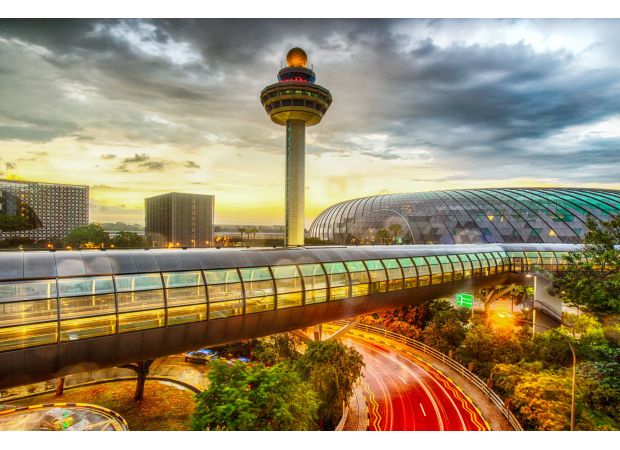Airport introduces passport-free technology for fast security clearance in 10 seconds.
What's next for flying?

Passengers passing through the popular airport can now rely on state-of-the-art facial recognition technology for a seamless travel experience. This airport, which has been named the best in the world multiple times, boasts impressive features such as a towering indoor waterfall, luxurious lounges, rooftop bars, and even a butterfly garden. And now, with its new passport-free system, passengers can breeze through immigration in less than 10 seconds.
At Singapore's Changi Airport, travellers no longer have to show their passports at the checkpoint, thanks to the implementation of facial recognition and iris biometrics. This futuristic technology was launched on September 30th across all four terminals, benefitting permanent residents and long-term pass holders who can now enjoy hassle-free travel. Since its launch, close to 1.5 million travellers have experienced the convenience of the 'passport-less' New Clearance Concept, with an average clearance time reduction of 60%, from 25 to 10 seconds.
Even foreign visitors can take advantage of this system, as long as their biometric data was captured upon arrival. While passports are still required for arrival, they can use the passport-less system for departure. However, the Immigration & Checkpoint Authority advises all travellers to bring their passports, as their destination countries may still require them for clearance. This luxurious airport has truly set the bar high for others around the world.
Children under six are currently unable to use the new system and will need to go through manual immigration clearance. The idea of a passport-free system has been in the works for some time, with many countries racing to implement facial recognition technology. Abu Dhabi's Zayed International Airport aims to introduce its Smart Travel Project by 2025, which will include biometric sensors at every checkpoint, from check-in counters to immigration booths, duty-free tills, airline lounges, and boarding gates.
The technology is already being used at certain points of the airport, with plans to expand it across the entire airport in the near future. Other airports around the world, such as Hong Kong International, Tokyo Narita, Tokyo Haneda, and Delhi's Indira Gandhi International, also have biometric terminals in place. Even European airports have jumped on the trend, with the International Air Transport System partnering with British Airways to trial the first fully integrated digital identity international flight last year.
In this trial, a passenger flew from London Heathrow to Rome Fiumicino using only their digital identity, with their stored passport, e-ticket, and visa verified by biometric recognition. Milan Linate Airport has also implemented a facial recognition system called 'FaceBoarding' after a successful trial period. This system allows adult passengers to pass through security and board their flight without a boarding pass or passport. Upon checking in, passengers can register for FaceBoarding at designated kiosks, with plans for a mobile app to be available on both Android and iOS devices.
While no airport has officially gone completely passport-free, it seems that the future of air travel is heading in that direction. Have you experienced this new technology at an airport? Share your story by emailing us at email. We'd love to hear about your experience.






